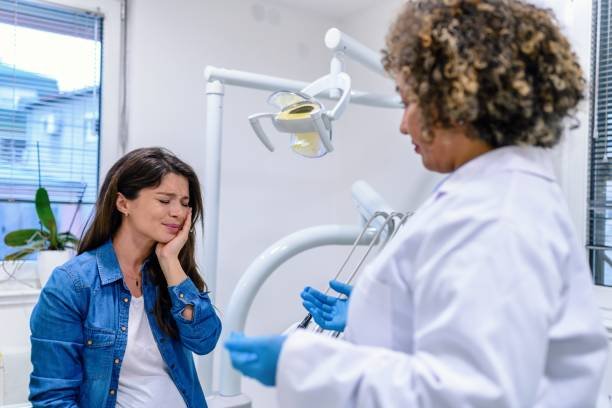Physical Address
304 North Cardinal St.
Dorchester Center, MA 02124
Physical Address
304 North Cardinal St.
Dorchester Center, MA 02124

Find out the causes, treatment, and prevention of bad breath for a fresh mouth.

Regular dental cleanings and check-ups play a crucial role in maintaining optimal oral health. These routine visits to the dentist are essential for preventing and detecting dental issues early on, before they escalate into more serious problems. During a dental cleaning, a dental hygienist will thoroughly remove plaque and tartar build-up from your teeth, which cannot be effectively done with regular brushing and flossing alone. They will also polish your teeth, leaving them smooth and shiny, which not only enhances your smile but also reduces the risk of future plaque accumulation.
In addition to the cleaning, regular dental check-ups allow dentists to examine your mouth for any signs of dental problems such as gum disease, cavities, or oral cancer. Detecting these issues in their early stages enables prompt treatment, preventing further damage and potentially saving your teeth. Moreover, a dentist will evaluate the overall health of your mouth and jaw, checking for proper alignment and function. They can provide guidance on proper oral hygiene practices, including brushing techniques and the use of dental accessories such as toothbrushes, floss, and mouthwashes that suit your specific needs. By prioritizing regular dental cleanings and check-ups, you will not only maintain a healthy smile but also safeguard your overall well-being.

Gum disease and dental issues are common problems that can significantly impact oral health if left untreated. These conditions can cause discomfort, pain, and even tooth loss if not properly addressed. Thankfully, there are various treatment options available to effectively manage gum disease and resolve dental issues.
In the case of gum disease, early detection is crucial for successful treatment. This is why regular dental check-ups are important, as they allow your dentist to identify any signs of gum disease and take appropriate action. Treatment for gum disease typically involves deep cleaning of the affected area, known as scaling and root planing, to remove plaque and tartar buildup. In more severe cases, surgical interventions may be necessary to repair damaged gum tissue or regenerate bone structure. Your dentist will tailor the treatment plan based on the severity of the gum disease and your individual needs.
When it comes to dental issues such as cavities or tooth decay, timely intervention is also key. Depending on the extent of the damage, your dentist may recommend various treatment options, ranging from fillings to dental crowns or root canal therapy. These procedures aim to restore the structure and function of the affected tooth, while preventing any further complications. Your dentist will evaluate the condition of your teeth and recommend the most appropriate treatment option to ensure optimal oral health. Taking prompt action when dental issues arise can help preserve your natural teeth and maintain a healthy smile in the long run.

Dry mouth, also known as xerostomia, is a common condition that can cause discomfort and affect oral health. Saliva plays a crucial role in maintaining a healthy mouth by moisturizing and lubricating the tissues, neutralizing acids, and washing away debris. When there is a decrease in saliva production, it can lead to dryness, difficulty in speaking and swallowing, as well as an increased risk of dental issues such as tooth decay and gum disease.
Managing dry mouth involves various approaches aimed at increasing saliva production and alleviating the symptoms. One effective method is staying hydrated by drinking plenty of water throughout the day. This helps to stimulate saliva production and prevent excessive dryness. In addition, avoiding caffeine and alcohol, which can contribute to dehydration, is beneficial in managing dry mouth. Using over-the-counter saliva substitutes or artificial saliva products can also provide temporary relief. These products help to moisten the mouth and alleviate dryness, providing a more comfortable oral environment.
When it comes to avoiding bad breath, paying attention to your diet is crucial. Certain foods and drinks are known to trigger unpleasant odors in the mouth. One common culprit is garlic, which contains sulfur compounds that can linger on the breath long after you’ve eaten it. Onions, with their pungent flavor, can also contribute to bad breath. Additionally, strong-smelling spices like curry and cumin may leave their mark on your breath.
Another factor to consider is alcohol consumption. Alcoholic beverages, such as beer and wine, can have a drying effect on the mouth, reducing saliva production and allowing bacteria to flourish. Furthermore, the breakdown of alcohol by the body can result in a distinct odor on the breath. It’s important to note that certain breath mints or mouthwashes containing alcohol may also contribute to dry mouth and mask bad breath temporarily, without addressing the underlying causes.
By being mindful of the foods and drinks you consume, you can take a proactive approach to combating bad breath. Limiting your intake of garlic, onions, strong spices, and alcohol can help keep your breath fresh. Instead, opt for breath-friendly options like fresh fruits and vegetables, fiber-rich foods, and plenty of water to maintain optimal hydration.
Here’s a table summarizing foods and drinks to avoid to prevent bad breath:
| Foods and Drinks to Avoid | Description | Credible Source |
|---|---|---|
| Foods High in Sulfur | Sulfur-containing foods, such as onions, garlic, and cruciferous vegetables (e.g., broccoli, cabbage), can contribute to bad breath as sulfur compounds are released during digestion and metabolized in the body. | Mayo Clinic: Link |
| Strongly Spiced Foods | Spicy foods containing strong spices or seasonings, such as curry, hot peppers, and cumin, can leave lingering odors in the mouth and contribute to bad breath. | American Dental Association (ADA): Link |
| Acidic Foods and Beverages | Acidic foods and drinks, including citrus fruits, tomatoes, and carbonated beverages, can increase acidity in the mouth and contribute to the breakdown of tooth enamel, leading to bad breath and dental erosion. | WebMD: Link |
| Dairy Products | Dairy products, such as milk, cheese, and yogurt, can promote the production of odor-causing bacteria in the mouth, particularly if consumed in excess or without proper oral hygiene practices. | National Institutes of Health (NIH): Link |
| Sugary Foods and Beverages | Sugary Foods and Beverages, including candy, sodas, and sweets, provide a food source for bacteria in the mouth, leading to increased plaque formation, tooth decay, and bad breath. | Centers for Disease Control and Prevention (CDC): Link |
| Alcoholic Beverages | Alcoholic beverages can contribute to bad breath by drying out the mouth and decreasing saliva production, which helps to cleanse the mouth and neutralize odor-causing bacteria. | American Academy of Periodontology (AAP): Link |
| Coffee and Strongly Caffeinated Drinks | Coffee and strongly caffeinated drinks can contribute to bad breath due to their drying effect on the mouth and the presence of compounds that can linger and cause odor. | National Institute of Dental and Craniofacial Research (NIDCR): Link |
| Processed Foods and Fast Food | Processed foods and fast food items, high in sugars, fats, and artificial additives, can promote the growth of bacteria in the mouth and contribute to bad breath. | American Heart Association (AHA): Link |
Quitting smoking and tobacco use is essential for maintaining good oral health. Smoking cigarettes and using tobacco products can have detrimental effects on your teeth and gums. The chemicals in tobacco can stain your teeth, causing them to become yellow or brown in appearance. Additionally, smoking can lead to an increased risk of gum disease, tooth loss, and oral cancer.
Research has shown that quitting smoking can have significant benefits for your oral health. Within a few weeks of quitting, you may notice improvements in the appearance of your teeth as stains start to fade. Furthermore, quitting smoking can help reduce your risk of developing gum disease and oral cancer. By quitting smoking, you are taking an important step towards safeguarding your oral health and overall well-being.
It is important to seek professional help and support when quitting smoking, as it can be a challenging process. Your dentist can provide guidance and resources to assist you in your journey towards a smoke-free life. They can also help monitor your oral health and address any concerns or issues that may arise during the quitting process. By quitting smoking and tobacco use, you are not only improving your oral health but also taking a significant step towards improving your overall quality of life.
Addressing underlying medical conditions is an essential aspect of managing bad breath. Certain medical conditions can contribute to the development of chronic bad breath, also known as halitosis. Addressing these underlying conditions is crucial in effectively treating and preventing bad breath in the long term.
One common medical condition that can cause bad breath is gum disease, also known as periodontal disease. The build-up of plaque and bacteria in the gums can lead to inflammation and infection, resulting in an unpleasant odor. Treating gum disease through professional dental cleanings, oral hygiene practices, and addressing any underlying factors, such as poor oral hygiene or smoking, can significantly improve bad breath.
Another medical condition that can contribute to halitosis is dry mouth. Saliva plays a vital role in maintaining oral health by neutralizing acids and flushing away bacteria. When saliva production is reduced, bacteria can thrive, leading to bad breath. Managing dry mouth involves identifying the underlying cause, such as medication side effects or certain medical conditions, and addressing it accordingly. This may involve changes in medication, lifestyle modifications, or using saliva substitutes to increase moisture in the mouth.
It is important to consult with a healthcare professional to identify and address any underlying medical conditions that may be contributing to bad breath. By doing so, individuals can effectively manage their halitosis and ensure optimal oral health.
Adjusting medications may be necessary in certain cases to manage bad breath. Some medications can cause dry mouth, which can contribute to bad breath. Dry mouth occurs when there is a decrease in saliva production, and saliva helps to wash away food particles and bacteria in the mouth. Without enough saliva, bacteria can thrive, leading to unpleasant odors. In such cases, dentists may recommend adjusting the dosage or changing the medication to minimize the side effect of dry mouth and alleviate bad breath.
Additionally, certain medications may have compounds that can contribute to a foul odor. For example, some antibiotics or antihistamines contain sulfur compounds that can be released in the breath, resulting in bad breath. In these cases, dentists may work with patients and medical professionals to explore alternative medications or adjust dosages to mitigate the effects on breath odor. It is essential to consult with healthcare professionals before making any changes to medication, as they can provide tailored advice based on an individual’s specific needs and medical history.
Regular dental visits for early detection and prevention are crucial in maintaining fresh breath and overall oral health. During these visits, your dentist will thoroughly clean your teeth, removing plaque and tartar buildup that can contribute to bad breath. They will also check for any signs of gum disease or tooth decay, which can be underlying causes of halitosis. By addressing these issues early on, you can prevent them from worsening and causing persistent bad breath. Your dentist may also provide personalized advice on oral hygiene practices and recommend specific products or techniques to help combat halitosis.
In addition to regular dental check-ups, practicing good oral hygiene at home is essential for preventing bad breath. Brushing your teeth at least twice a day using a fluoride toothpaste not only cleans your teeth but also helps to remove food particles and bacteria that can cause odor. Don’t forget to gently brush your tongue as well, as it can harbor bacteria and contribute to foul-smelling breath. Flossing daily is equally important, as it removes plaque and debris from between the teeth and along the gum line, where a toothbrush can’t reach. Using antibacterial mouthwash and tongue cleaners can also enhance your oral hygiene routine by killing bacteria and freshening your breath.
Maintaining good oral hygiene is crucial for preventing bad breath and ensuring optimal dental health. One of the most important habits to cultivate is regular brushing and flossing. Brushing your teeth at least twice a day helps remove plaque, food particles, and bacteria that can contribute to bad breath. It is recommended to use a soft-bristled toothbrush and fluoride toothpaste to effectively clean your teeth and gums.
In addition to brushing, flossing is equally essential for maintaining oral hygiene. Many people overlook the importance of flossing, but it plays a critical role in removing plaque and food debris from between your teeth and along the gum line. When you don’t floss, these hard-to-reach areas become breeding grounds for bacteria, which can lead to gum disease and bad breath. Make sure to floss at least once a day, using gentle, back-and-forth motions to clean the sides of each tooth and the space between. Incorporating these simple yet effective oral hygiene practices into your daily routine can go a long way in preventing bad breath and maintaining a healthy smile.
Using mouthwash and tongue cleaners can be an effective way to maintain good oral hygiene and combat bad breath. Mouthwashes are specially formulated solutions that can help kill bacteria in the mouth, freshen breath, and provide an added layer of protection against cavities and gum disease. Tongue cleaners, on the other hand, are small devices designed to scrape away the bacteria and food particles that accumulate on the surface of the tongue. By incorporating both mouthwash and tongue cleaners into your daily oral care routine, you can ensure that your breath stays fresh and your mouth stays healthy.
When choosing a mouthwash, it is important to opt for an alcohol-free formula that is gentle on the gums and other soft tissues in the mouth. Look for a mouthwash that contains fluoride, as this mineral can help strengthen tooth enamel and prevent tooth decay. Tongue cleaners, on the other hand, can typically be found in the oral care aisle of most supermarkets or drugstores. They are easy to use and can quickly remove the debris that can cause bad breath. By using a tongue cleaner and mouthwash in conjunction with regular brushing and flossing, you can help keep your mouth clean and your breath fresh throughout the day.
Drinking plenty of water and staying hydrated is not only important for overall health, but it also plays a crucial role in maintaining good oral hygiene. Water helps to wash away food particles and bacteria in the mouth, reducing the risk of bad breath and dental issues. Additionally, staying hydrated helps to keep the mouth moist and saliva flowing, which is important for neutralizing acids and protecting tooth enamel.
When we don’t drink enough water, our saliva production decreases, leading to a dry mouth. Dry mouth can contribute to the development of bad breath, as bacteria thrive in a dry environment. It can also increase the risk of tooth decay and gum disease, as saliva plays a key role in neutralizing acids and washing away bacteria and food particles. By drinking plenty of water throughout the day, we can help ensure an adequate flow of saliva, keeping our mouths healthy and fresh.
In addition to drinking water, it is important to limit the consumption of sugary and acidic beverages, such as sodas and fruit juices, as they can contribute to dental problems and bad breath. Instead, opt for water as your primary beverage choice, and remember to stay hydrated throughout the day. By making hydration a priority and drinking plenty of water, you can support good oral health and keep your breath fresh.
Eating a balanced diet and avoiding strong-smelling foods plays a crucial role in maintaining fresh breath and overall oral health. The foods we consume can directly impact the odor of our breath. Strong-smelling foods such as garlic, onions, and certain spices contain sulfur compounds that are absorbed into the bloodstream and eventually exhaled through the breath. Therefore, minimizing the consumption of these foods can help reduce the occurrence of bad breath.
On the other hand, incorporating a balanced diet that includes plenty of fruits, vegetables, and whole grains can have a positive effect on oral health. These foods are rich in vitamins and minerals that support healthy gums and teeth. For instance, foods rich in vitamin C, such as oranges and strawberries, can strengthen blood vessels and reduce the risk of gum disease. Additionally, crunchy fruits and vegetables like apples and carrots can help stimulate saliva production, which is essential for flushing out bacteria and keeping the mouth moist.
In conclusion, maintaining a balanced diet and being mindful of the foods we consume can significantly contribute to fresh breath and optimal oral health. By avoiding strong-smelling foods and incorporating nutrient-rich options, we can minimize the occurrence of bad breath and promote a healthier mouth. However, it is important to remember that dietary changes alone may not solve all cases of chronic bad breath, and it is always advisable to consult a dentist if the problem persists.
Smoking and excessive alcohol consumption not only have detrimental effects on overall health but also contribute to bad breath. Quitting smoking is crucial for maintaining oral health and fresh breath. Smoking not only stains teeth and affects the sense of taste but also increases the risk of gum disease and oral cancer. The chemicals in tobacco products can cause a persistent and unpleasant odor in the mouth, making it difficult to maintain fresh breath. By quitting smoking, individuals can greatly improve their oral health and reduce the risk of developing chronic bad breath.
Similarly, limiting alcohol consumption can also have a positive impact on oral hygiene and breath freshness. Alcohol has a drying effect on the mouth, reducing saliva flow and promoting bacterial growth. Dry mouth, or xerostomia, can lead to bad breath as saliva helps to naturally cleanse the mouth and neutralize odor-causing bacteria. Furthermore, alcoholic beverages are often high in sugar content, which can contribute to tooth decay and bad breath. By moderating alcohol intake and staying hydrated, individuals can support saliva production and reduce the chances of developing unpleasant breath odors.
Chewing sugar-free gum or mints can be an effective way to combat bad breath and keep your mouth feeling fresh throughout the day. When you chew gum or suck on mints, it stimulates the production of saliva in your mouth. Saliva acts as a natural cleanser, washing away food particles and bacteria that can cause bad breath. It also helps to neutralize acids in the mouth and restore a proper pH balance, which can prevent the growth of odor-causing bacteria.
It’s important to choose sugar-free gum or mints to avoid the negative effects of sugar on dental health. Sugar can contribute to tooth decay and cavities, so opting for sugar-free options is a healthier choice for your oral hygiene. However, it’s worth noting that chewing gum should not replace proper oral hygiene practices such as brushing and flossing. Instead, it should be used as a supplement to maintain fresh breath throughout the day, especially after meals or when brushing is not immediately possible.
Regular dental visits are crucial for maintaining good oral health and preventing dental issues. These visits allow dentists to detect any problems at an early stage, which can lead to more effective and less invasive treatment. During these visits, dentists perform a thorough examination of the teeth, gums, and mouth, looking for signs of tooth decay, gum disease, oral cancer, and other oral health issues.
Early detection of dental problems is key to preventing further damage and complications. For example, if tooth decay is identified early on, it can be treated with a simple filling, whereas if left untreated, it can progress to more severe decay and require a root canal or even tooth extraction. Similarly, gum disease, if caught early, can be managed and treated before it leads to tooth loss and other serious complications.
In addition to detecting and treating dental issues, regular dental visits also provide an opportunity for dentists to educate patients on proper oral hygiene practices and preventive measures. Dentists can offer advice on brushing techniques, flossing, and using mouthwash effectively. They can also discuss the impact of diet and lifestyle choices on oral health and provide personalized recommendations for maintaining optimal oral hygiene.
Overall, scheduling regular dental visits is a proactive approach to oral health. By keeping up with these appointments, individuals can stay ahead of potential problems, ensure early detection and prevention of dental issues, and enjoy a healthy and confident smile.
Maintaining overall good health and hygiene practices is essential for not only preventing bad breath but also maintaining optimal oral health. Regularly brushing and flossing your teeth, along with using mouthwash and tongue cleaners, helps to remove plaque and bacteria that can contribute to bad breath. It is recommended to brush your teeth at least twice a day and floss daily to effectively clean your entire mouth.
Additionally, drinking plenty of water and staying hydrated is important for saliva production, which helps in washing away food particles and bacteria. A dry mouth can contribute to bad breath, so it is crucial to drink enough water throughout the day. Avoiding strong-smelling foods, such as onions and garlic, can also help to prevent bad breath. These foods contain volatile compounds that can linger in the mouth and cause an unpleasant odor.
Overall, maintaining good oral hygiene practices and following a healthy lifestyle are key in ensuring fresh breath and optimal oral health. By incorporating these preventive measures into your daily routine, you can confidently smile and interact with others, knowing that your breath is fresh and your oral health is well taken care of.
It is recommended to visit your dentist for regular cleanings and check-ups every six months.
Gum disease and dental issues can be treated by maintaining good oral hygiene practices, such as brushing and flossing regularly, and seeking professional dental treatment if necessary.
To manage dry mouth, you can try drinking plenty of water, chewing sugar-free gum, using saliva substitutes, and avoiding tobacco and alcohol consumption.
To prevent bad breath, it is best to avoid foods and drinks that are strong-smelling, such as garlic, onions, coffee, and alcohol.
If you suspect an underlying medical condition contributing to bad breath, it is important to consult with your healthcare provider for proper diagnosis and treatment.
If you suspect that your medications may be causing bad breath, it is important to consult with your healthcare provider before making any adjustments or changes.
To prevent bad breath, it is important to practice good oral hygiene, drink plenty of water, eat a balanced diet, avoid tobacco and alcohol, and visit your dentist regularly.
It is recommended to visit your dentist every six months for regular check-ups and early detection of dental issues.